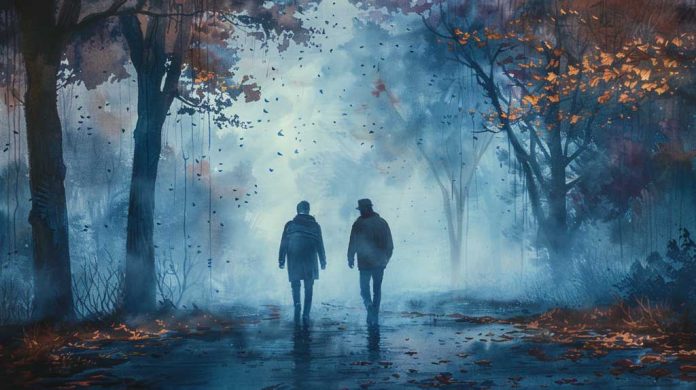The Unexpected Teacher: A Chance Encounter Redefines Grief
The enduring nature of profound sadness often reveals itself in the most unexpected moments. During my routine evening walks, I encountered a lady whose pain mirrored my own, offering a profound lesson in grief.
As I approached her, I noticed her unsteady gait and frequent pauses. Something in her demeanour spoke of a deep, unresolved sorrow. When our eyes met, I slowed my pace to match hers, setting aside my usual brisk rhythm.
Our conversation began casually but quickly deepened. She shared the heart-wrenching loss of her 15-year-old son to leukaemia seven years prior. Her words resonated with my own experiences of loss and separation from my children.
In that moment, we connected through our shared understanding of the enduring nature of profound sadness. It wasn’t just about feeling low; it was a fundamental shift in our beings, a constant companion in our daily lives.
This chance encounter challenged my perception of grief. It wasn’t something to ‘get over’ or ‘move past’. Instead, it was a testament to the depth of our love and the indelible mark left by those we’ve lost or been separated from.
As we parted ways, I realised that the most valuable insights sometimes come from unexpected sources. This lady, a stranger on my familiar walking route, had become an unexpected teacher, redefining my understanding of long-term grief.
The Enduring Nature of Profound Sadness vs. Depression: When Loss Transcends Clinical Definitions
Our encounter wasn’t our first. I’d greeted this lady a year earlier, and her surprise at such a simple kindness stuck with me. Since then, our paths have crossed frequently, each interaction building a foundation of trust.
On this day, as we dug deeper into our shared experiences, the enduring nature of profound sadness became starkly apparent. It wasn’t the same as the clinical depression I’d grappled with; this was different, more permanent.
“I love the way that you love me,” she said, catching me off guard. My genuine interest and empathetic body language had created a safe space for her to open up, a phenomenon psychologists call ‘unconditional positive regard’.
As we compared our emotional states, the distinction between sadness and depression crystallised. Depression, I realised, was something I could work through with time and support. But this profound sadness? It had become a part of us, woven into the fabric of our being.
The lady spoke of counsellors and therapists, all well-meaning but ultimately unable to help. “Unless they can bring my son back,” she said, “they can’t fix this.” Her words echoed my own feelings about the loss of my children.
This enduring nature of profound sadness doesn’t simply fade with time. It’s not a phase to pass through or an illness to cure. Instead, it’s a fundamental shift in how we experience the world, born from losses too significant to ever truly ‘get over’.
As our conversation continued, I found myself reconsidering my own journey. The enduring nature of profound sadness isn’t a sign of weakness or failure to heal. Instead, it’s a testament to the depth of our capacity to love and the indelible mark left by those we’ve lost.

The Myth of “Getting Over It”: Embracing Life with Enduring Sadness
Society often peddles the notion that we’ll “get over” our losses with time. Yet, the enduring nature of profound sadness defies this simplistic view. It’s not a hurdle to overcome but a new reality to navigate.
As the lady and I continued our walk, she shared her frustration with well-meaning friends who expected her to “move on”. Similarly, I’d faced pressure to “get over” the loss of my children. These expectations, however well-intentioned, felt like a betrayal of our ongoing pain.
The enduring nature of profound sadness doesn’t mean we’re stuck or failing to progress. Instead, it’s a testament to the depth of our connections and the significance of our losses. It becomes a part of us, shaping our perspective and influencing our interactions.
We discussed how this sadness coexists with moments of joy and laughter. It’s not an all-consuming darkness but a bittersweet undercurrent in our lives. We’ve learned to carry it, acknowledging its presence without letting it define us entirely.
Embracing this sadness doesn’t mean giving up on life. Instead, it’s about integrating our losses into our ongoing stories. We’re not “getting over it”; we’re learning to live with it and finding meaning and purpose despite – or perhaps because of – our enduring sorrow.
As we rounded a corner, the lady remarked, “It’s like learning to walk with a limp”. This analogy struck me as particularly apt. The enduring nature of profound sadness may slow us down, but it doesn’t stop us from moving forward. It’s a challenging path that allows for a deeper, more authentic engagement with life.
Finding Meaning in Shared Pain: The Power of Human Connection
The enduring nature of profound sadness often leads to isolation, yet it can also forge unexpected connections. During our walk, the lady and I discovered a shared understanding that transcended our brief acquaintance.
Our conversation delved into the heart of our grief, revealing how this profound sadness had become a constant companion. It wasn’t just a fleeting emotion but a fundamental shift in our beings, colouring every aspect of our lives.
She described her sorrow as a physical weight, a heaviness that resided in her heart. I nodded, recognising this sensation all too well. The void left by the loss of my children mirrored her own emptiness, defying time and distraction.
We found solace in our shared experiences, creating a space where our enduring sadness could exist without judgment. No platitudes or empty reassurances were necessary; we simply acknowledged each other’s pain.
Memories, both painful and cherished, wove through our dialogue. We spoke of triggers – a familiar scent or song that could instantly transport us back to moments of loss, reigniting our grief with startling intensity.
The lady confessed she’d stopped trying to explain her feelings to others. “They just don’t get it,” she said, her voice tinged with resignation. This resonated deeply with me, highlighting how the depth of our pain often left others uncomfortable and unsure.

Navigating a World That Expects Recovery: The Enduring Nature of Profound Sadness in Daily Life
The world doesn’t stop for our grief. Bills still need paying, jobs demand our attention, and social obligations persist. Yet, the enduring nature of profound sadness colours every aspect of these daily tasks.
My encounter with the lady brought this into sharp focus. She spoke of returning to work after her son’s death, facing colleagues who expected her to be “back to normal”. I recalled similar experiences, the pressure to perform as if my world hadn’t shattered.
This profound sadness doesn’t adhere to society’s timelines. It doesn’t clock out at 5 p.m. or take weekends off. It’s there in mundane moments—shopping, watching television, or casually chatting with family or friends.
The lady described how she’d become adept at wearing a mask, presenting a façade of okayness to the world. I understood this all too well. The enduring nature of our sadness often feels at odds with a society that expects swift recovery and constant productivity.
We discussed the exhaustion that comes with this constant navigation. It’s the sadness and energy expended in managing others’ expectations, in explaining – or often, not explaining – why we can’t simply “cheer up” or “move on”.
Carrying this sadness in a world that often seems ill-equipped to acknowledge it creates a unique loneliness. The lady said, “It’s like speaking a language no one else understands.” We learned that we’ve found ways to function, carry it with us, and incorporate it into our daily existence.
Lessons from the Heart: What the Enduring Nature of Profound Sadness Can Teach Us About Life
The enduring nature of profound sadness isn’t a lesson we’d have chosen to learn. Yet, it offers insights that reshape our understanding of life, love, and human resilience.
Through my conversation with the lady and my own experiences, I recognise that this sadness isn’t a flaw or a failure. It’s a testament to the depth of our capacity to love and the indelible impact others have on our lives.
We discussed how this profound sadness has altered our perspectives. Minor irritations that once seemed significant now pale in comparison. The lady remarked, “After losing my son, a bad hair day just doesn’t matter anymore.” I nodded, understanding all too well.
This enduring sadness has taught us about the transient nature of life. It’s made us acutely aware of the preciousness of moments and the importance of genuine connections. We’ve learned to value authenticity over superficial pleasantries.
The experience has also revealed the limitations of conventional wisdom about grief and recovery. We’ve learned that it’s okay not to ‘get better’ and that carrying this sadness doesn’t make us broken or weak.
Perhaps most importantly, we’ve learned about the strength of the human spirit. Despite carrying this weight, we continue. We find moments of joy, forge new connections, and contribute to the world around us.
This profound sadness has become a lens through which we view the world. It’s not rose-tinted, nor is it entirely dark. It’s a perspective that acknowledges the complexity of human experience and the coexistence of sorrow and resilience. It does not mean tomorrow will be better or your time will come, but just accept it!


